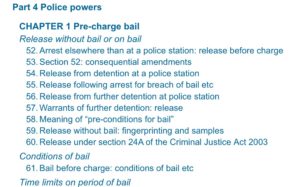Monthly Archives: March 2017

Chesterfield Crime Solicitor David Gittins recently represented a young man before Chesterfield Magistrates Court. His client had been charged with the serious offence of section 20 Grievous Bodily Harm or GBH. It was alleged he had broken the jaw of the complainant.
The sentencing guidelines mean that such an offence will regularly carry a custodial sentence upon conviction. Furthermore, such cases will often be dealt with before the Crown Court.
In this case, David gave careful consideration to the guidelines and the facts. As a result he was able to convince the court not only to keep the case but also to impose an alternative to immediate custody.
Free police station advice and representation
Experienced Police Station Representative Rob Lowe first attended Chesterfield Police station with our client. This was some months before the matter finally came before the court.

Rob was able to provide free legal advice following arrest for grievous bodily harm. This was under the legal aid scheme. Such advice is not means tested so as a result will always be free of charge.
Having a legal representative in the police station is always important. Rob was able to secure information from the police about the incident. As a result the client knew in advance what the allegation was. Rob took our client’s instructions. He was then able to advise on the strength of the evidence.
The evidence was very strong as our client was named as the aggressor. Our client accepted that he was guilty of the offence. He then had a decision to make as to whether he would answer police questions or not.
Rob was able to explain that there is often something to be gained by answering police questions even where a person will accept guilt at court. In this case it was important that our client explain at the outset why he had acted as he did. It was an early opportunity for him to say how sorry he felt. This would help him gain maximum credit on sentence when the case reached court.
Late service of CCTV evidence (again)
When the matter was eventually charged David took over the management of the case to prepared the case for court. Although the entire incident was covered by CCTV this was not available until the day the case was first in court.
The footage was clear and showed our client punching the victim once to the face. He was knocked to the ground. Sadly the victim was left with a fractured jaw that needed surgery. The Prosecution was to argue that the case should be allocated to the Crown Court as the Magistrates’ sentencing powers were insufficient.
Representations on mode of trial and allocation
David was able to argue against that, relying on a number of factors:
- The CCTV footage showed his client breaking up a fight immediately before he threw the punch
- he walked off straight away
- there was a single punch so no follow up
- he was of good character
- he was only 18 at the time of the incident
- his early admission of guilty
The Magistrates were taken through the relevant sentencing guidelines in detail. As a result, despite prosecution representations, the Magistrates agreed the case could remain in their court. The case was adjourned in order that a pre-sentence could be obtained from the probation service.
Suspended sentence for Grievous Bodily Harm
When the matter returned to Court a week later the Probation service had prepared a report. Although prison remained an option, the report concluded that our client’s risk could be managed outside the prison system. As a result, any punishment could properly be within the community.
David’s powerful and reasoned mitigation led to his client receiving a twelve week sentence of imprisonment. This sentence would be suspended. This was combined with community elements and compensation.
As a result our client was understandably delighted. He realised just how close he had come to receiving an immediate prison sentence.
Contact a Chesterfield Criminal Defence Specialist
Without condoning violence, the outcome shows that with the right preparation a court can be persuaded to sentence on the basis of single mistake that will never be repeated. There is often flexibility within the guidelines to permit a sentence that properly reflects the mitigation available to a client.
However, you will only be able to secure the best result for you in the circumstances if you choose your legal representatives carefully.
If you face a police investigation or court proceedings for an offence such as Grievous Bodily Harm then you can contact David or Rob at our Chesterfield office on 01246 283000. Alternatively you can use the form below to email your enquiry to us.
Contact
Monthly Archives: March 2017

Chesterfield Crime Solicitor David Gittins recently represented a client in difficulties at Chesterfield Magistrates’ Court. The client had committed an offence in breach of a suspended sentence.
The court would have to be given a good reason not to activate the sentence.
The Allegation
David’s client had been arrested in relation to two allegations of common assault owing to having been drinking all day. He had drunk about 20 pints of lager so had not considered the consequences.
His partner who had been with him left the public house. Unfortunately she had taken an item of sentimental value belonging to the pub landlord. As a result the landlord understandably followed her and retrieved the item. Meanwhile, David’s client remained at the pub.
When his partner returned she was suddenly tripped up and landed heavily on the floor. Without thinking, our client punched the male to the face and a small scuffle began. The scuffle ended after a few moments and the David’s client began talking to others at the scene.
During this time, he lashed out again, punching another male to the face before walking away from the pub.
Offence in breach of a suspended sentence
When charged and before the court David’s client accepted that he was guilty of the charges. He entered guilty pleas. Unfortunately, these offences were committed in breach of a suspended sentence imposed three weeks previously.
As a result, the court would immediately consider that the suspended sentence ought to be activated. A separate sentence would be imposed for the new offences. The likelihood was that this would happen at the first appearance and without reports being prepared.
Mitigation sought to try and avoid the inevitable
David secured information to put before the Court in a bid to convince it not to send his client to prison. David took detailed personal mitigation from his client. The client was very proud to say that he had undertaken a period of alcohol abstinence and had been dry, albeit for a short period.
His main concern was not for himself but rather his daughter. He cared for her four nights per week so that his ex-partner was able to work on the evenings he had his daughter. If his client was sent to prison it was unclear who would provide the necessary case. His ex-partner may have had to leave her employment because there were no other family members close by to assist.
Additionally any period of imprisonment would have resulted in our client’s online business closing so staff would be made redundant. His current partner would be as a result unable to maintain payments on their family home. Customers would lose out as well.
David spoke with the probation service at court. Therefore he gained information confirming that his client was progressing well on his suspended sentence order. He had begun to resolve long term issues in his life.
Unjust to activate the suspended sentence
Owing to his detailed preparation, David was able to address the Magistrates at length about the reasons behind the recent offending. He could provide significant personal mitigation. David outlined the good progress that his Client was making under his current order. Much emphasis could also be placed on the impact to others if our client was sent to prison. This last factor was perhaps the most important in persuading the court it was unjust to activate the prison sentence.
After listening to this extensive mitigation the Magistrates agreed that the suspended sentence should not be activated. Instead they imposed a community order with a stand alone curfew for 12 weeks.
Following the breach of a suspended sentence the court extended the operational period by 6 months.
Our client was relieved not to face a prison sentence and because of that he was delighted with the outcome.
Contact a Chesterfield Criminal Defence Lawyer
If you find yourself under investigation by the police or face court proceedings and wish to instruct David then please him telephone at our Chesterfield office on 01246 283000.
Alternatively you can contact him using the form below.
Contact
Monthly Archives: March 2017
Nottingham crime solicitor Alex Chapman represented a client at Nottingham Magistrates’ Court. The allegations arose out of an alleged road rage incident.
The case proceeded to trial and after witnesses had been called Alex addressed the Magistrates on the evidence. Our client was found not guilty.
The Allegation
It was said to be a road rage incident. The complainant and Alex’s client were said to have pulled over in their vehicles. They then got out of their cars and confronted one another.
The complainant told the Court that our client punched him twice without provocation. Alex’s client denied punching the complainant in his police interview. Instead he said that he did have to push him backwards to defend himself. This was only after the complainant had tried to punch him first.
Command of the evidence allowed focused questions
Alex’s command of the evidence allowed him to cross-examined the complainant in detail. In particular he asked him about several comments he had made to the police in his statement. He had not repeated them in court.
For example, he had stated that when he got out of his car his ‘blood was up’. He accepted that he had been swearing at our client. The complainant also said that he practised mixed-martial-arts. A belief had been expressed that he could have ‘wiped the floor’ with our client if he had wanted.
These comments were capable of raising a doubt as to who was the aggressor. The Magistrates might be suspicious of the complainant’s motives for withholding this information.
The complainant’s wife gave evidence as well. Under careful cross examination Alex brought out a number of discrepancies. The effect of this was to cast substantial doubt over the Prosecution case.
Our clients was a victim of road rage
Alex’s client gave evidence. He explained that his wife, mother-in-law and two young children were present at the scene. The Court was told Court that the Complainant had been acting extremely aggressively. The complainant swung a punch at him first so he had little choice but to push him away.
Our client’s wife also attended to give evidence, Although extremely nervous, she gave an account entirely consistent with that of her husband.
Burden and standard of proof
In order to convict our client the Magistrates’ had to be sure of his guilt. He did not have to prove anything. Alex addressed the Magistrates in his closing speech. Discrepancies in the Prosecution case were highlighted to the Court. Alex reminded the bench of the level of aggression expressed by the complainant in his original police statement.
It appeared that the complainant had been unable to contain his own bravado when he had spoken to the police officer. This revealed the truth of the incident.
In the circumstances Alex’s client had little reason to have punched the complainant without provocation as described.
On considering all of the evidence the Magistrates decided that Alex’s client was not guilty.
Free legal aid funding
Alex’s client was financially eligible for legal aid to ensure his free representation before the Magistrates’ Court.
Contact a Nottingham criminal defence lawyer
If you are under investigation by the police or face court proceedings then you will want to seek expert advice and representation in your case.
The trial here was at Nottingham Magistrates’ Court. Alex’s client lived in the Chesterfield area. Alex was able to see him at our Chesterfield office to prepare his case. This prevented a lengthy, expensive and inconvenient journey for him and his family. We will always seek to prepare your case in the most convenient manner for you.
Alternatively you can use the following contact form:
Contact
Monthly Archives: March 2017
The issue of pre-charge bail periods has been highlighted in the national press in recent years following the arrest of high profile individuals as part of major criminal investigations such as Operation Yewtree.
Campaign to limit pre-charge bail successful?
The spotlight has been on those individuals placed on Police bail for month after month following arrest whilst investigations were completed into the alleged crimes. The impact of these long delays, which are rarely explained, on the suspect, victims and the administration of Justice cannot be underestimated. A summary of the campaign to change the procedure can be found here.
As such the Government has attempted to address this in the new Policing and Crime Act 2017. However, while the revised 28 day bail period may be headline grabbing, a closer look shows a complex set of rules which reveal that this limitation is not what it seems.
Police bail in the past
The previous rules for individuals arrested by the police and placed on police bail whilst investigations continue in England and Wales are rather simple and open to abuse or lack of proper consideration. A custody sergeant would base a decision on what they were told by an investigating officer. He could be easily persuaded that it was necessary and proportionate to impose bail so that the Police could continue to investigate an offence. Bail could be granted to obtain a decision from the Crown Prosecution Service (CPS) to charge. The bail could be subsequently extended if more time is was requested and justified.
There were no time limits imposed on this, other than where minor offences needing to be charged within 6 months of the commission of the offence.
Bail without limit of time
As a result suspects who have not been convicted of any crime could remain on bail for months at a time, often with bail conditions that limited their private lives. They would not know if they were to face criminal prosecution or not. Thus people’s lives would be put on hold, simply waiting for a return on bail to the police station to find out their fate. Often, they were simply re-bailed as the investigation was said not to be complete. The waiting would begin again.
In some cases there may well be justification for such delays. For example, there may a large number of witnesses to find and speak to during a public disturbance, or expert forensic evidence is needed to be sought and tested, or hours of CCTV footage to be considered.
Often, however, any extension was due to officers not completing necessary enquiries due to the level of their workloads, lack of resources, unhelpful shift patterns, holidays and the transfer of cases between officers. The impact on a suspect or alleged victim could be immeasurable and so needed addressing.
New pre-charge bail rules from 3 April 2017
Due to this need the Policing and Crime Act 2017 has been passed. This brings in new rules on all new arrests from 3rd April 2017.
 The main principal of the new law is that there is a presumption is introduced. This applies in cases where Police are not in a position to seek a charging decision immediately following a first detention. In these cases the suspect will be released without bail and contacted in the future if further enquiries deem it necessary.
The main principal of the new law is that there is a presumption is introduced. This applies in cases where Police are not in a position to seek a charging decision immediately following a first detention. In these cases the suspect will be released without bail and contacted in the future if further enquiries deem it necessary.
The legislation acknowledges that a large proportion of cases currently investigated result in a suspect being placed on Police bail whilst further enquiries are made. Therefore the presumption seems unlikely to apply in many cases and instead the police will continue to place suspects on bail.
28 Day Limit on pre-charge bail
Under the new law the police, where they feel it necessary and proportionate, can impose bail on the suspect to return to the police station in 28 days. This is substantially shorter than previous pre-charge bail time scales adopted by the police. It is designed with the hope that the police will continue to investigate the offence. There will not be the prejudice of substantial delays on the suspect or alleged victim.
Within that 28 day period the police are expected to conclude their enquiries. They should also obtain a decision as to whether the suspect should be charged. This should be a straightforward obligation on the police that should improve matters for all.
Rules undermining 28 day pre-charge bail limit
The 28 day limit is unfortunately qualified in several ways. For example, the period is suspended if the case is transferred to the Crown Prosecution Service for a charging decision. It only restarts when the case is returned from them to the Police.
As a result, if the CPS inform the officer that they will need 3 months to consider the file the suspect will simply have his bail enlarged for that period. It will not count. Whilst the Police would still have to consider if it is necessary and proportionate to have the suspect on bail for that period, past experience tells us that they will. Delays will continue.
Additionally, at the end of any 28 day period the prosecution can advise the officer that further work is required. The investigating officer can ask a Superintendent to extend the bail period by up to three months.
Time with the CPS doesn’t count
This three months is from the first arrest. However, it doesn’t include any time that the file has been with the prosecution. As a result it is likely to be longer. If at the end of this extended period the investigation is still not concluded the police can apply to a Magistrates’ Court for yet more time. This process can be repeated. It is unlikely that these applications will be conducted in a transparent manner, and disappointment with bail extension decisions are likely to persist.
Separate rules for designated cases
Applications to extend the length of pre-charge bail times will not be reserved for the most complex and serious cases. Such cases are deemed Designated Cases for the purposes of the legislation. These cases are allowed to wait even longer before any extensions to the bail period are sought.
Judicial oversight in bail cases is welcome. It will ultimately lead to frustration where the threshold for permitting an extension is low. There is further speculation that police will sidestep the legislation limiting pre-charge bail by treating the suspect as a volunteer. They are never arrested and not placed on bail, so the limits do not apply.
As a result, the headline grabbing 28 day bail limit will not do what it appears to say on the tin. Whether it will speed up justice and remove concerns about pre-charge bail times remains to be seen.
Contact a criminal defence lawyer to discuss pre-charge bail concerns
We have always recognised the impact that lengthy periods on police bail can have on our clients. We would always take the opportunity to make representations as to whether bail should be extended.
Our criminal defence solicitors and accredited representatives have received training in relation to the new provisions. They know what we need to do to ensure that your interests are protected during the investigation stage.
Alternatively you can contact us using the form below and we will be in touch.
Contact
Monthly Archives: March 2017
Nottingham and Newark crime solicitor Lauren Manuel recently represented a client appearing before Nottingham Magistrates’ Court for drink driving. Her mitigation meant that he avoid an immediate prison sentence even though his reading was over four times the legal limit.
Lauren represented her client under an affordable fixed fee agreement.
Drink driving – over four times the legal limit
The client was driving his motor vehicle in Nottingham during rush hour. A witness saw the client drive wide around a bend crossing the central line. He tried to correct the vehicle. The car then headed towards a kerb and he lost control of the car. It hit a telegraph pole with enough force so that it caused the pole to be sheared off. It fell into the path of oncoming traffic.
Lauren’s client then attempted to get out of the vehicle and leave the scene. Instead he was detained by members of the public. He cooperated with the police when they asked for a specimen of breath. Unfortunately it was over four times the limit. The offence was further aggravated as he had neither insurance cover or a valid driving licence.
Mitigation avoids immediate prison sentence
Such a high reading in combination with the aggravating circumstances would normally result in an unavoidable and immediate prison sentence. Instead, Lauren was able to use her experience and persuasive advocacy to ensure that the Magistrates felt able to impose a suspended sentence instead.
Lauren identified that she would be able to put compelling personal mitigation before the court so that prison could be avoided. She was able to demonstrate to the Magistrates that her client needed assistance. Of late he had found himself in extremely difficult circumstances. Prior to those arising, and this incident, he had been a man of good character. He had no previous convictions or cautions.
As a result, the court was able to balance her client’s personal mitigation and credit for his guilty pleas against the very serious aggravating features of the offence.
Although he was to be punished, that punishment was a suspended sentence. He was to undergo rehabilitation and address his alcohol misuse. He was, of course, disqualified from driving for a lengthy period.
Affordable Fixed Fee Representation
Although Lauren’s client was not financially eligible to receive free legal aid, she was able to offer him representation by way of an affordable fixed fee.
Contact a motoring law solicitor
Whether you are admitting an offence or intend to contest an allegation such as drink driving you will benefit from seeking expert advice and representation. If you wish to speak to Lauren then please contact her on 0115 9599550. Alternatively you can use the following contact form:
Contact
Monthly Archives: March 2017

Derby criminal solicitor advocate William Bennett recently acted for a client facing sentence for allegations of possessing Class A drugs with intent to supply. William’s representations helped secure a deferred sentence.
The starting point for sentence for supply of a single Class A drug after a trial is often in the region of four and a half years. As a result, William’s client was at real risk of a significant prison sentence.
Two types of Class A drug
The case was unusual. William’s client, a drug addict, had seen a drug dealer hide drugs in a public place. He was intending to recover them later. Instead, our client stole the drugs. The drugs were both heroin and crack cocaine. While he admitted that he would have used some of the drugs himself, he would have sold some to other drug users for profit.
As set out above, the relevant sentencing guidelines would suggest an appropriate starting point of four and a half years. This would be after trial. William’s client had entered his guilty plea only on the morning of the trial. As a result he would be entitled to a very limited reduction in sentence for his guilty plea.
William’s client had, however, used the delays in proceedings to put his life in order. He had made massive strides towards becoming drug free and turning his life around. On this occasion his offending was due to him succumbing to temptation in an opportunistic fashion.
Successful argument for a deferred sentence
As a result, William was able to persuade the Learned Judge to take the truly exceptional step of deferring sentence. The Judge set our client various conditions to keep to prior to a sentencing later this year.
If he keeps to the conditions of his deferred sentence then he can expect, in due course, to receive a sentence that will not involve immediate custody.
The case was a good example of a robust but compassionate Judge being able to take an unusual course having heard cogent and well thought out submissions from the defence advocate in the case of a defendant who had demonstrated through his actions a determination to change his life completely.
Contact a Criminal Defence Lawyer
We provide advice and representation at the police station, Magistrates’ and Crown Courts across the country. We have six offices based in the East Midlands. If you face police investigation or criminal proceedings then you can find your local office here.
If you wish to contact William Bennett then please telephone him on 01332 546818 or email him using the form below.
Contact
Monthly Archives: March 2017

Derby criminal solicitor advocate William Bennett recently represented a client appearing before Sheffield Crown Court who had taken drugs into prison.
The substantial and powerful mitigation that William was able to put forward permitted the judge to depart from what would have usually been substantial sentence of immediate imprisonment.
Drugs into Prison
William’s client had taken both cannabis and anabolic steroids into a prison. He intended to supply a serving prisoner. The drugs were for onward supply in the prison.
At the time of the offence, our client had been a heroin addict. As a result he had placed himself in a position where he was vulnerable to pressure from his dealer. This was why he had committed the offence in the first place.
Powerful mitigation from client’s decision to change
William’s client had used the delay between initial arrest and sentence to good effect. He had managed to become drug free and secure employment. His guilty plea in this case was further evidence of a commitment to change. He had been undertaking weekly drug tests for a six month period. He received favourable reports from his work and was a doting father to his son. A letter provided by his former partner was able to confirm this.
The Learned Judge was unable to suspend sentence because of strong guidance from the Court of Appeal as to the need for deterrent sentences in such cases. He did, however, reduce the sentence dramatically from what was expected. William’s client received a sentence of only ten weeks, meaning that he was likely to be released having served a little over three weeks in prison.
‘All that could be said’
The case is a good example of an experienced Judge being able to show leniency in a case where an experienced solicitor advocate has said “all that could be said” for a realistic defendant. In this case, our client, while recognising that custody was inevitable, had demonstrated that he was committed to rehabilitation and his family.
Contact a Criminal Defence Lawyer
We provide advice and representation at the police station, Magistrates’ and Crown Courts across the country. We have six offices based in the East Midlands. If you face police investigation or criminal proceedings then you can find your local office here.
If you wish to contact William Bennett then please telephone him on 01332 546818 or email him here.
Monthly Archives: March 2017

Newark criminal solicitor Ian Carter recently represented a client at a special reasons hearing. The hearing was successful. His client avoided the usual driving disqualification owing to the shortness of distance driven.
There are very limited circumstances in which a driving disqualification can be avoided for an offence of drink driving. You might be able to do so if you can show that ‘special reasons’ exist that allow the Magistrates’ to use their discretion not to impose a driving ban.
Factors for a successful Special Reasons argument
In deciding on such an argument, the court will look at the following factors that relate to the offence:
- How the vehicle was driven
- The manner I which it was driven
- The state of the vehicle
- Whether the driver intended to drive any further
- The prevailing road and traffic conditions at the time
- Whether there is any possibility of danger by coming into contact with other road users
- The reason for the vehicle being driven in the first place
You will see that these factors do not relate to the personal circumstances of the offender.
Shortness of Distance Driven
In this case, Ian argued on behalf of his client that a special reason existed owing to the shortness of distance driven. His client had been seen moving a van that had been parked on The Wharf in Newark from a roadside parking bay across to a car park.
The distance involved was no more than 30 yards.
As Ian is based in Newark he was able to visit the scene without difficulty. He was also able to speak with a local traffic warden and discuss how the parking in that area was policed. This was information that was used at the final hearing.
Ian’s client gave evidence to the court that she had moved the vehicle in the early hours to avoid receiving a parking ticket. Her intention was to collect the vehicle the next day. Our client’s partner also gave evidence in support of this account. The agreed police evidence showed the shortness of distance driven and that the journey was concluded.
Ian was able to use court room technology to show the Magistrates’ the area using Google Maps and Street View. This allowed the court to properly understand that the risks involved in moving the van were low.
Special Reasons found, driving ban avoided
The Magistrates found that there were special reasons not to disqualify. The evidence given was credible and established the shortness of distance driven. There was no bad driving. Due to the time there were no pedestrians or other vehicles. This meant there was little risk to others. The Magistrates were sure that there was no intention to drive further until the following day. Ian’s client would have been under the legal limit to drive when she collected the vehicle.
As a result, although she was fined, Ian’s client did not receive a driving ban. If you are due before the court for an offence that could lead to a disqualification then it will help to instruct a solicitor. You may be entitled to free legal aid for your representation or be able to take advantage of an affordable fixed fee.
Contact a Newark Criminal Solicitor for Newark cases
If you are being investigated by the police or face court proceedings then please contact Newark criminal defence lawyer Ian Carter on or email him here.
If you face police investigation or criminal proceedings elsewhere then you can find your local office here.
Monthly Archives: March 2017
 Newark crime solicitor Ian Carter recently represented a client on relatively minor matter at Newark police station.
Newark crime solicitor Ian Carter recently represented a client on relatively minor matter at Newark police station.
Although the arrest was for a low value shop lifting, Ian’s client had previous cautions for theft. She had also previously been convicted and sentenced at court.
As a result, the police would usually make the decision that such a client should be charged and put before Nottingham Magistrates’ Court.
Representations avoid court proceedings
As Ian’s client had chosen to have a solicitor in the police station, Ian was able to speak with the sergeant at Newark police station who was to make the decision. He was able to persuade the officer that although his client had a record, the convictions were limited. His client had been out of trouble for eight months. All of the previous offending had been when she was a youth. This was her first offence as an adult.
The sergeant was persuaded that he could take a lenient view on this occasion. He agreed to give her a first adult caution. As her previous conviction was now spent, she would not have a record that would necessarily hold her back in her search for employment.
Free Police Station Representation
VHS Fletchers hold a contract with the government to provide advice and representation in the police station. The advice is not dependent on your earnings. The advice is therefore free of charge to everyone under the police station legal aid scheme. It will not cost you anything to instruct a solicitor to help you secure a favourable outcome if interviewed by the police.
Contact a Newark Criminal Solicitor for Newark Police Station
If you are being investigated by the police or face court proceedings then please contact Newark criminal defence lawyer Ian Carter on or email him here. If you face police investigation or criminal proceedings elsewhere then you can find your local office here.
Monthly Archives: March 2017

Experienced Derby criminal solicitor Nick Wright recently dealt with a difficult sentencing hearing at Derby Youth Court.
His client was due for sentence for two robberies, four burglaries and going equipped to steal. This catalogue of offences would have been so serious alone that the court would have been considering a custodial sentence.
The position was further aggravated. The latter offences were committed while the youth was on bail for the robberies. They had also been committed whilst in breach of bail conditions. He was also subject to a community order for another robbery.
Sentence of detention inevitable?
Although the likelihood was that his client would receive a sentence of detention, Nick had spent some time with his client and knew that he was vulnerable himself. Nick identified that this was a case where his client would benefit from a report from a psychologist. Nick spent a great deal of time with the his client’s parents and social worker. He had ongoing contact with the Youth Offending Team.
Derby Youth Court imposes rehabilitation order
The sentencing hearing took two and a half hours to conclude. In the end, Nick’s powerful and persuasive mitigation meant that the Magistrates decided not to impose detention. Instead a Youth Rehabilitation Order was made. This is intended to be a far more constructive sentence to assist a young man to try and put offending behind him.
Some clients intend to admit an allegation. Custody may seem inevitable. These clients will still benefit from instructing an experienced solicitor. The solicitor will be able to identify the steps that can usefully be taken to try and secure the best outcome possible on the facts of a client’s case.
Contact a Derby Criminal Solicitor
If you are being investigated by the police or face court proceedings then please contact Derby criminal defence lawyer Nick Wright on 01332 546818 or email him here. If you face proceedings elsewhere then you can find your local office here.


